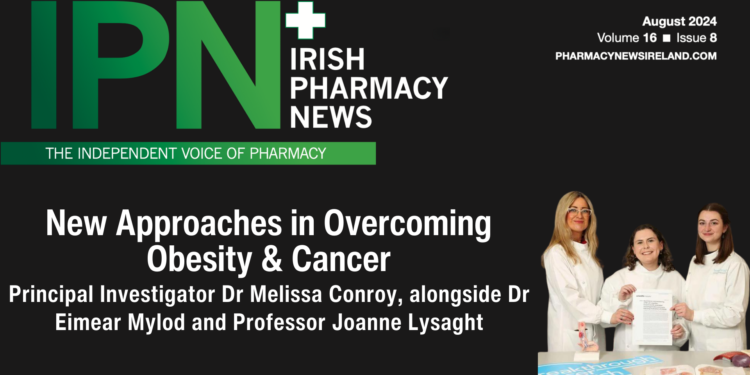Cancer patients with the condition of obesity could see more positive outcomes from immunotherapy treatment
Scientists, funded by Breakthrough Cancer Research, have discovered revolutionary new approaches to overcome key challenges presented by obesity in the treatment of Oesophageal cancer through the redirection of Natural Killer Cells.
There is no one-size-fits all treatment for cancer and some forms of the disease, like the ones linked to obesity such as Oesophagogastric adenocarcinomas (a type of oesophageal cancer which affects the lower part of the food pipe), can be especially difficult to treat and currently have very low survival rates.
In a ground-breaking development, a team of scientists in Trinity College Dublin, funded by Ireland’s leading cancer research charity Breakthrough Cancer Research, have discovered an innovative approach to making immunotherapy treatment more effective for these cancer patients. The findings, published recently in Nature-Scientific Reports show how a category of cancer-killing immune cells are profoundly and negatively impacted by ‘abdominal fat’ but can be redirected to the tumour by a new drug called E6130.
Oesophageal cancer has long posed a significant challenge in the medical field, with only one in four patients surviving past the critical five-year mark post-diagnosis.
Recognising the urgent need for transformative therapies, Principal Investigator Dr. Melissa Conroy, alongside Dr. Eimear Mylod and Professor Joanne Lysaght, have identified vast potential for novel immunotherapeutic approaches. Their research explores innovative strategies targeting the immune system, particularly Natural Killer (NK) cells. NK cells are the body’s own first-line defence against cancer and play a crucial role in directly recognising and eliminating cancer cells.
One of the key findings of the research, conducted by Dr. Eimear Mylod under Dr. Conroy and Prof. Lysaght’s mentorship, is the profound impact of obesity on oesophageal cancer progression. Notably, individuals with higher levels of visceral fat characterised by excessive abdominal fat, exhibit lower levels of NK cells within their tumours. Through rigorous investigation, the team identified a molecule known as Fractalkine, responsible for drawing NK cells into fat deposits, thus diverting them away from the tumour site where they are needed most.
Building upon this initial discovery, the team introduced an innovative intervention. By utilising a drug named E6130, they successfully redirected NK cells from fat deposits towards the tumour, marking a significant breakthrough in cancer immunotherapy. However, the journey towards effective treatment doesn’t end there.
Dr. Conroy and her collaborators encountered a subsequent challenge: upon reaching the tumour site, NK cells were suppressed in patients with the condition of obesity, hindering their anti-cancer activity. Undeterred, the researchers are now focused on overcoming the suppression of NK cells within such tumours. Whether through the introduction of fortified NK cells from healthy donors or through innovative strategies to counteract suppression within the tumour microenvironment, the team believes that they can enhance the efficacy of immunotherapies for oesophageal cancer patients.
“This research not only offers hope for oesophageal cancer patients but also holds promise for advancing immunotherapy across various cancer types,” stated Dr. Conroy. “By addressing the intricate interplay between the immune system, obesity and cancer, we are paving the way for more effective and personalised treatment approaches.”
The findings from this study represent a significant milestone in cancer research, with far-reaching implications beyond oesophageal cancer. As many as 13 cancers are currently strongly linked to obesity. As the medical community continues to unravel the complexities of cancer immunity, Dr. Conroy’s team stands at the forefront, driving innovation and delivering hope to patients worldwide.
The research is being funded by Breakthrough Cancer Research through their award-winning partnership with Qualtrics through their campaign called Five for the Fight. Orla Dolan CEO of Breakthrough Cancer Research said, “We are thrilled to see the publication of these powerful new findings. This team have not only unlocked how visceral or belly fat can impede a patient’s immune system reaching their tumour but they have gone a step further and found a way to overcome that. The immune system is a powerful tool in treating cancer but its complexity is still being unravelled. This research is a huge step in unleashing that tool for more patients.”
Breakthrough Cancer Research is Ireland’s leading cancer research charity. They work with researchers and scientists throughout Ireland and fund exceptional patent focused translational research throughout Ireland and beyond. They particularly focus on poor prognosis or low survival cancers which are often diagnosed at an advanced stage and are poorly served by current treatments.
Breakthroughcancerresearch.ie
Read our Latest News
Read IPN August











